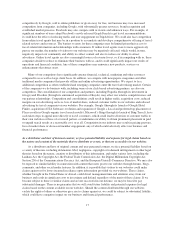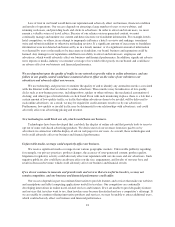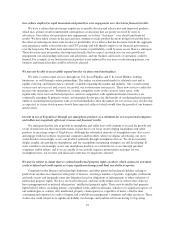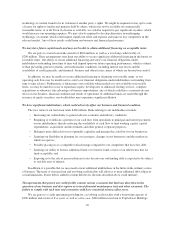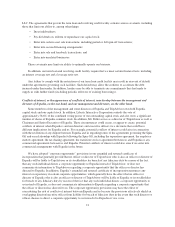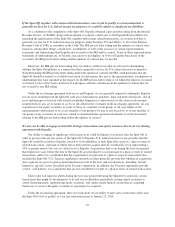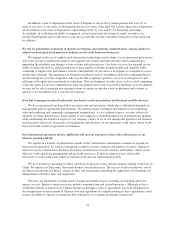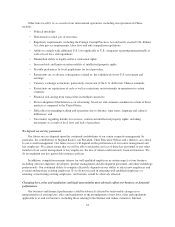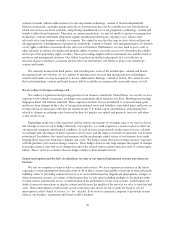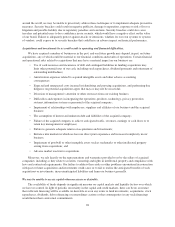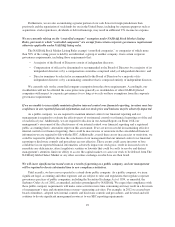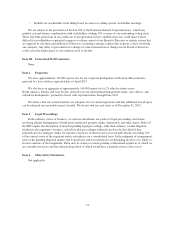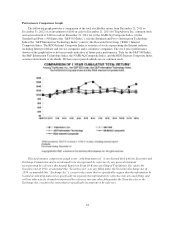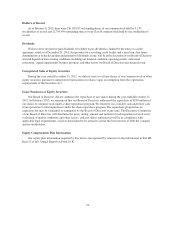TripAdvisor 2012 Annual Report Download - page 36
Download and view the complete annual report
Please find page 36 of the 2012 TripAdvisor annual report below. You can navigate through the pages in the report by either clicking on the pages listed below, or by using the keyword search tool below to find specific information within the annual report.content or brands without authorization or to develop similar technology, content or brands independently.
Effective trademark, copyright, patent and trade secret protection may not be available in every jurisdiction in
which our services are made available, and policing unauthorized use of our proprietary technology, content and
brands is difficult and expensive. Therefore, in certain jurisdictions, we may be unable to protect our proprietary
technology, content and brands adequately against unauthorized third-party copying or use, which could
adversely affect our business or ability to compete. We cannot be sure that the steps we have taken will prevent
misappropriation or infringement of proprietary technology, content or brands. Any misappropriation or violation
of our rights could have a material adverse effect on our business. Furthermore, we may need to go to court or
other tribunals to enforce our intellectual property rights, to protect our trade secrets or to determine the validity
and scope of the proprietary rights of others. These proceedings might result in substantial costs and diversion of
resources and management attention. Our failure to protect our intellectual property in a cost-effective or
effective manner could have a material adverse effect on our business and ability to protect our technology,
content and brands.
We currently license from third parties, and from Expedia, some of the technologies, content and brands
incorporated into our websites. As we continue to introduce new services that incorporate new technologies,
content and brands, we may be required to license additional technology, content or brands. We cannot be sure
that such technology, content and brand licenses will be available on commercially reasonable terms, if at all.
We are subject to foreign exchange risk.
We conduct a significant and growing portion of our business outside the United States. As a result, we face
exposure to movements in currency exchange rates, particularly those related to the Euro, British pound sterling,
Singapore dollar and Chinese renminbi. These exposures include, but are not limited to re-measurement gains
and losses from changes in the value of foreign denominated assets and liabilities; translation gains and losses on
foreign subsidiary financial results that are translated into U.S. dollars upon consolidation; and planning risk
related to changes in exchange rates between the time we prepare our annual and quarterly forecasts and when
actual results occur.
Depending on the size of the exposures and the relative movements of exchange rates, if we were to choose
not to hedge or were to fail to hedge effectively our exposure, we could experience a material adverse effect on
our financial statements and financial condition. As seen in some recent periods, in the event of severe volatility
in exchange rates the impact of these exposures can increase, and the impact on results of operations can be more
pronounced. In addition, the current environment and the increasingly global nature of our business have made
hedging these exposures both more complex and costly. We hedge certain short-term foreign currency exposures
with the purchase of forward exchange contracts. These hedge contracts only help mitigate the impact of changes
in foreign currency rates that occur during the term of the related contract period and carry risks of counter-party
failure. There can be no assurance that our hedges will have their intended effects.
System interruption and the lack of redundancy in some of our internal information systems may harm our
business.
We rely on computer systems to deliver content and services. We have experienced and may in the future
experience system interruptions that make some or all of these systems unavailable or prevent us from efficiently
fulfilling orders or providing content and services to users and third parties. Significant interruptions, outages or
delays in internal systems, or systems of third parties that we rely upon including multiple co-location providers
for data centers and network access, or deterioration in the performance of any such systems, would impair our
ability to process transactions or display content and decrease the quality of the services we offer to travelers and
users. These interruptions could include security intrusions and attacks on our systems for fraud or service
interruption (called “denial of service” or “bot” attacks). If we were to experience frequent or persistent system
failures, our business, reputations and brand could be harmed.
26



